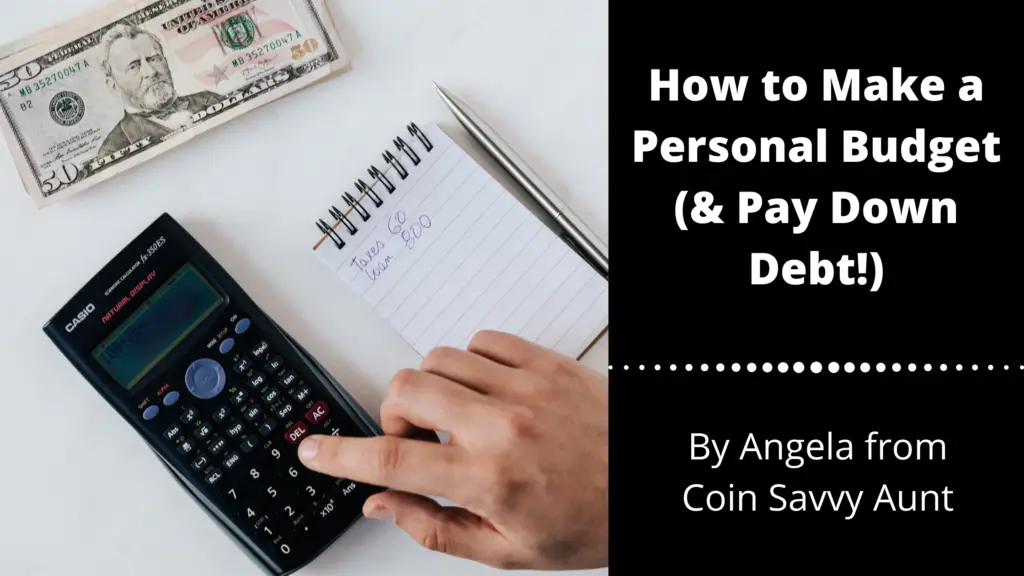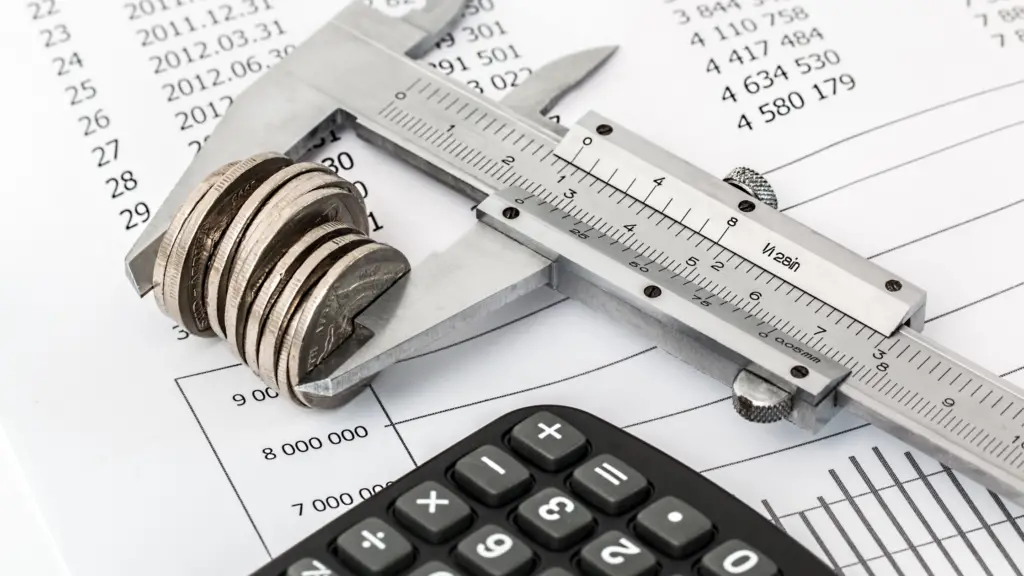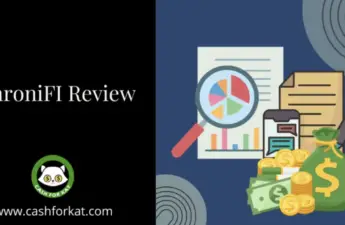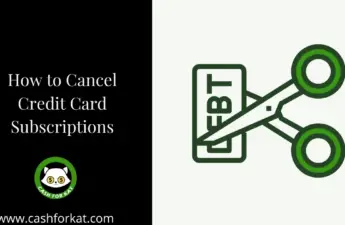How to Make a Personal Budget (& Pay Down Debt!), is our guest post for January by Angela Watson from The Coin Savvy Aunt!

This is Cash for Kat’s 5th guest post! If you would like to start at the beginning, check out Zero to Full-Time Income by Kathrin from A Chat with Kat. Our last guest post was on How to Maximize Your Freedom, Even in a Downturn! by Matt from Millennial Mutiny.
Without further ado, here is everything you need to know how you can make a personal budget so that you can start paying down debt!
How to Make a Personal Budget
I didn’t have a personal budget until I was in my 20’s. In fact, I didn’t have much of a financial plan beyond making sure I could pay my bills and the minimums on my credit cards.
The first few years of my adult life pretty much consisted of making money, paying bills, and going out on weekends.
And for a while, that was enough for me.
But without a personal budget, I was never able to save money or get rid of debt. And investing? Forget it.
Living without control of your money gets old. Eventually, you need to keep track of where your money is going. Otherwise, those credit card statements will keep coming – and possibly increasing. And any time your bills increase, or a financial emergency happens, you’ll be unprepared for it.
If you’re ready to pay off that credit card or loan once and for all, you need to be in control of your money. If you want to start investing in your future, you need a personal budget.
The good news is, even if you’re making minimum wage, you can still benefit from having a personal budget.
Are you ready to get started?
5 Simple Steps to Make a Personal Budget
Making a personal budget doesn’t have to be hard. In fact, you can get started right now by following these 5 steps.
Step 1: Calculate your monthly income
Start by figuring out your total monthly income. This includes anything that contributes to your available funds each month:
- Active income from a job
- Passive income
- Annual or holiday bonuses
- Money from side hustles
- Government aid
- Alimony or child support
Make a list of all the ways you make money each month. For some, this amount fluctuates from month to month. If that sounds like you, you can either average out the previous 3+ months’ earnings or base your budget on the lowest amount.
I’d recommend going with the second option. It’s always nice to have some wiggle room!

Step 2: Figure out your monthly expenses
Now that you know your total monthly income, it’s time to calculate your fixed and variable expenses.
Fixed expenses include anything that doesn’t change from month to month. Or, if it does, it is minimal. Examples of fixed expenses:
- Housing (rent, mortgage, etc.)
- Car loan
- Insurance (car, home, renter’s, health)
- Personal loans
Variable expenses are things that can change on a weekly or monthly basis. Examples include:
- Food/groceries
- Entertainment
- Personal development or education
- Gasoline
Certain expenses – like utilities and credit card payments – can count as either fixed or variable, depending on your usage and their rates.
Once you’ve calculated your expenses, add everything together to get your total.
Step 3: Separate your wants and needs
Now that you know your monthly expenses, it’s time to separate them based on wants and needs. There’s a good chance you’ll find an unexpected opportunity for savings by doing this.
Common wants include:
- Fun and entertainment
- The latest gadgets – phone, computer, etc.
- Subscriptions to 3 different streaming services (maybe that’s just me?)
Common needs include:
- Groceries
- Common household items – cleaning supplies, toilet paper, lightbulbs, etc.
- Pet-care – food, meds, vet visits
Sometimes, there’s a fine line between wants and needs. You may want a new pair of shoes… or you may need one. Set aside a portion of your income for your own interests and wants and stick with it.
Step 4: Move money around
By having a personal budget and thinking about where your money is going, you can start making changes your wallet will thank you for. Once you start looking into your expenses, you may find that you’re spending more on certain areas than you need to.
For instance, if you’re spending $30 every Friday night going out to eat, try cutting back to every other week. Or skip the appetizer and overpriced drinks. Another option would be to bundle your every day services as much as possible. Providers like xfinity internet offer good rates when you order more than one of their services!
Before you go to the grocery store, make a weekly, biweekly, or monthly meal plan. You’d be surprised how much you can save by planning out your meals, especially if those meals involve leftovers. If you can save even $20 a week at the grocery store, that’s $80 a month.
And if you have a credit card that doesn’t seem to be going anywhere fast, consider putting some of that spare $80 towards debt instead. A credit card you can never pay off is killer on your finances.
Say you owe $1,692 on a major credit card with a 19.90% APR, and the current minimum is $51. Assuming you only pay the minimum, you never use the card, you always pay on time, and there are no hidden fees, it can take up to 10 years to pay it off in full.
But what if you could pay $70 a month instead? Or $100? By redistributing your money, even a little bit, you can save yourself hundreds or thousands of dollars in interest, as well as months or years in the repayment period.
Step 5: Make a goal for the future
Finally, make a goal for your money. This can be anything from paying off your credit cards to building an emergency fund or saving for a down payment on a house.
Having a personal budget is great in the short-term, but without goals, you may still find yourself struggling to balance your income with your expenses.
When you have something to work towards, it gives you more incentive to keep going. And when you accomplish a goal, there’s a good chance you’ll want to keep going.
Advantages of Having a Personal Budget
There are far more advantages to having a personal budget than not. Sure, you have to commit. You need to keep track of how much money is coming in vs. how much is going out.
But you also get some really cool advantages.
- A personal budget keeps you accountable. This is especially useful for those of us who are bad at managing our money. When you see those numbers changing each week or month, you are responsible for keeping them on track.
- Having a personal budget gives you the ability to not only plan but also to accomplish your goals. Knowing where your money goes every month helps keep you on track for bigger, better things in your future.
- A personal budget prepares you for times of crisis. This can be a pandemic, layoff from a job, a sudden move, health-related circumstance, or anything else you might not have expected. With a personal budget in place, you have more control over your money.
- A personal budget provides peace of mind. Let’s face it, life’s full of the unexpected. Your budget can make all the difference in how you (and your family) fare during a financial challenge.
- It allows you to save and invest your money. From planning for personal retirement to setting up a trust fund for a loved one, a budget brings you closer to the lifestyle and future you want.
Tips for Sticking with Your Personal Budget
For some of us (myself included), making a personal budget is the easy part. Sticking with it, on the other hand, can be a challenge.
Luckily, there are several tricks to making your budget more effective in your life:
- Make your personal budget based on your net income, not gross.
- Never make your budget based on an expected promotion or pay raise.
- Calculate your total income and expenses. Even the things that seem small add up quickly. If you don’t have exact numbers, estimate costs on the higher end to leave some wiggle room for yourself.
- Make categories to help you keep organized. Write down each expense and keep the list somewhere visible.
- Leave your credit and debit cards at home whenever you can. Instead, keep a small (budgeted) amount of cash on your person or in your wallet and take that with you when you go out.
- Avoid automating things like monthly subscriptions. They sneak up on you fast.
- Keep track of your expenses on a regular basis to prevent unnecessary stress.
Wrapping up
Whether you have $1,000 in debt or $25,000, a personal budget can help you get it under control. By taking action and managing your money, you can not only start paying down that debt, but get to a point where you live debt-free.
And the best part? You can make a budget on any amount of income – including minimum wage.
Even when you’re debt-free and everything’s going well financially, keep budgeting your finances and planning for the future. Remember to update your budget as your income and expenses change.
Ultimately, your quality of life matters. While a personal budget can help you achieve a life without debt, try to avoid cutting back so much that you end up dissatisfied.
Whenever possible, make sure you have a category in your budget for fun and other leisurely activities. You’ll thank yourself when you get to spend some of your hard-earned money on things you actually want.
Now that you’ve got a personal budget, what are some of your short- and long-term financial goals? Let us know in the comments!
This guest post was written by Angela Watson from The Coin Savvy Aunt, a blog about credit building, debt reduction, and managing money!


Some great tips from Angela! Having a budget is a great starting point to becoming more financially savvy, and this post provides a great method for people to get started.
Agreed! Budgeting is always the first step to a sound financial plan. There are so many different kinds out there that it is possible for everyone to find a method that works for them!